Back with another Kyoto post! (Yes, I resolve to finish my Japan series before the year ends, haha!) The last time we talked about my Japan trip was that time we went to check out the fall illumination at Kiyomizudera on the evening of the day we went around the Gion area wearing kimonos. So what happened on the afternoon in between? One word: Ginkaku-ji.
This is not to be confused with Kinkaku-ji, or the Golden Pavilion, which we visited the day before.
This time around, we are talking about Ginkaku-ji, or the Silver Pavilion, which is located in the Higashiyama area of Kyoto.
After lunch at Mimikou, we went back to return the kimonos and dressed back to our regular clothes. It was already around 2pm by this time.
From Gion, we relied on the Kyoto Sightseeing Guide Map that we thoroughly abused during our Kyoto stop, and jumped on one of the buses that took the route from Yasaka Shrine to Ginkaku-ji. If memory serves me right, it was Bus No. 100. Then we got off at the Ginkaku-ji-mae bus station. Was it difficult? Somewhat. Then we realized that almost everyone on the bus were headed the same way, because it’s, like, the second to the last stop of the bus we were riding on.
From the bus stop, we followed the stream of people heading towards one direction. It was a bit of a distance, but the path was paved, so it was no hardship at all.

 There is an entrance fee, and it’s only 500 JPY. In exchange, you get another one of these nifty tickets with kanji characters written on them and a brochure of the place.
There is an entrance fee, and it’s only 500 JPY. In exchange, you get another one of these nifty tickets with kanji characters written on them and a brochure of the place.
 The orange sign right there indicates that this place is another UNESCO World Cultural Heritage Site.
The orange sign right there indicates that this place is another UNESCO World Cultural Heritage Site.
 Already, I was fascinated by this pathway from the entrance to the courtyard which was flanked on both sides by tall hedges. These hedges are 50 meters long, so it’s quite an enjoyable walk. Later, Peach and I would be taking numerous photos (and failing frequently) with the least number of people in the background. The hedges were comprised of stones, camellias and bamboo.
Already, I was fascinated by this pathway from the entrance to the courtyard which was flanked on both sides by tall hedges. These hedges are 50 meters long, so it’s quite an enjoyable walk. Later, Peach and I would be taking numerous photos (and failing frequently) with the least number of people in the background. The hedges were comprised of stones, camellias and bamboo.
 As a bit of a background: Ginkaku-ji is a Zen temple that was established in 1482 by Ashikaga Yoshimasa, who is the grandson of Ashikaga Yoshimitsu, who was the one who built Kinkaku-ji. Yoshimasa was the 8th Muromachi Shogunate, and when he retired, he established a villa in the eastern mountains (Higashiyama) as his retirement home. His plan was to mirror that Golden Pavilion built by his grandfather, and his version was to be the Silver Pavilion.
As a bit of a background: Ginkaku-ji is a Zen temple that was established in 1482 by Ashikaga Yoshimasa, who is the grandson of Ashikaga Yoshimitsu, who was the one who built Kinkaku-ji. Yoshimasa was the 8th Muromachi Shogunate, and when he retired, he established a villa in the eastern mountains (Higashiyama) as his retirement home. His plan was to mirror that Golden Pavilion built by his grandfather, and his version was to be the Silver Pavilion.
The formal name of this place is Higashiyama Jishoji, but the common name is what is know now, Ginkaku-ji.
I already expected well-manicured gardens, but I was still amazed at how pretty everything was. We first came upon the dry sand garden, or the “Sea of Silver Sand”. It got its name because, apparently, on moonlit nights, it sparkles like silver. Oh, I’d have loved to see that~

 The circuit round the Sea of Silver Sand would bring us to the Kogetsudai, with its highlight, a sculpted mound of white sand which is said to represent Mt. Fuji.
The circuit round the Sea of Silver Sand would bring us to the Kogetsudai, with its highlight, a sculpted mound of white sand which is said to represent Mt. Fuji.
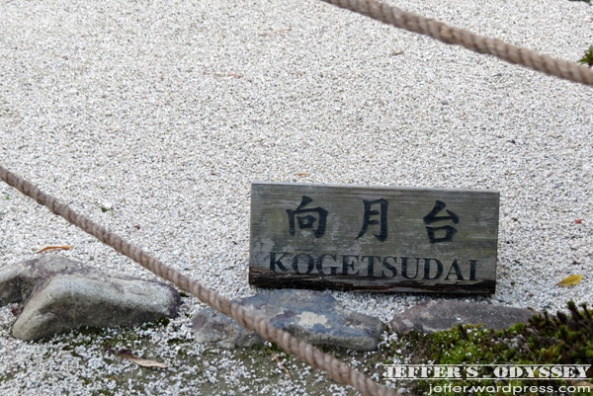
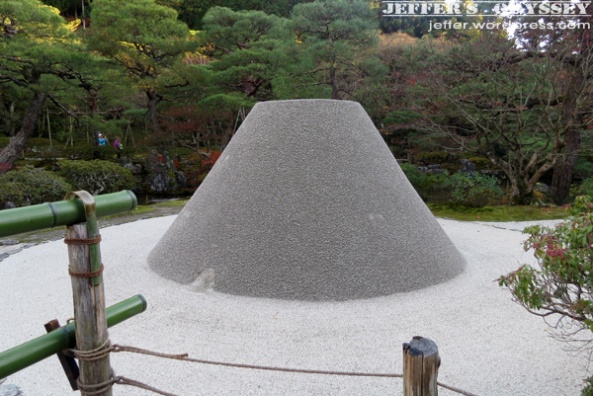
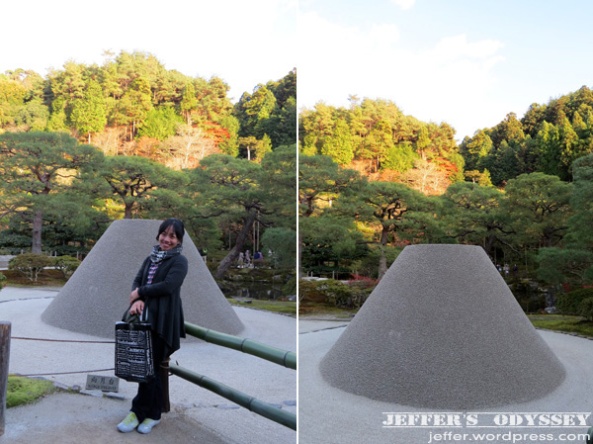 Continuing on, we found ourselves at another Japanese garden, and we laid eyes on the Ginshadan. The Ginshadan supposedly represents waves.
Continuing on, we found ourselves at another Japanese garden, and we laid eyes on the Ginshadan. The Ginshadan supposedly represents waves.
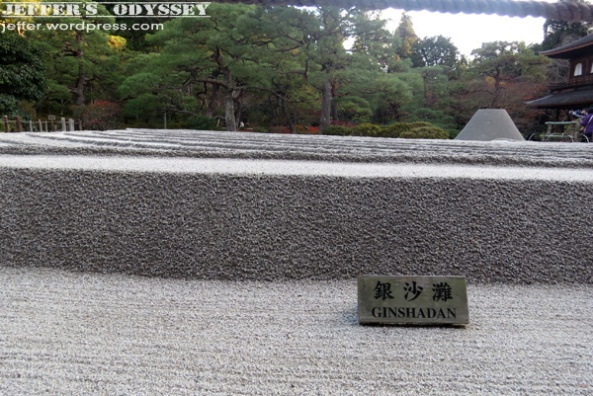
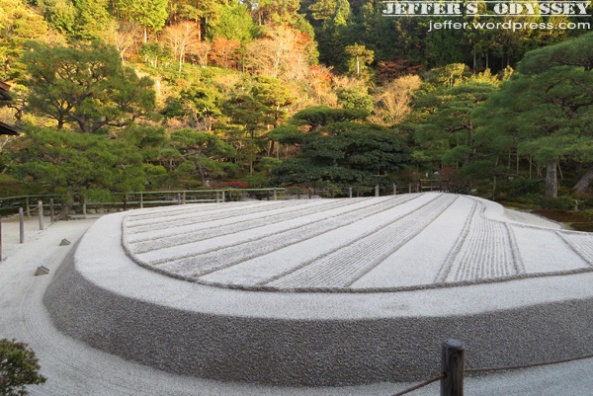
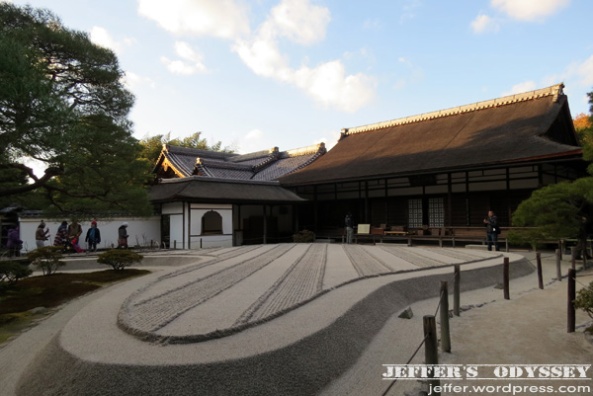 Here’s a setup in front of the Ginshadan. We were tempted to try, but we didn’t really know how to do it. I was afraid I might bungle it up if I did it wrongly, haha!
Here’s a setup in front of the Ginshadan. We were tempted to try, but we didn’t really know how to do it. I was afraid I might bungle it up if I did it wrongly, haha!
 I always expect a pond or body of water of some sort when visiting temples, and I wasn’t disappointed.
I always expect a pond or body of water of some sort when visiting temples, and I wasn’t disappointed.
 This one-story building right here, overlooking the pond, is the Togu-do, another national treasure of Japan. It is a Buddhist Hall with a 6-tatami mat room and a smaller 4.5-tatami mat room. Unfortunately, it was not open to the public.
This one-story building right here, overlooking the pond, is the Togu-do, another national treasure of Japan. It is a Buddhist Hall with a 6-tatami mat room and a smaller 4.5-tatami mat room. Unfortunately, it was not open to the public.  We went on following the walking path, which led us past a moss garden, and up the hill. Yes, it was quite a refreshing hike, and I just loooooved the breeze while going up.
We went on following the walking path, which led us past a moss garden, and up the hill. Yes, it was quite a refreshing hike, and I just loooooved the breeze while going up.
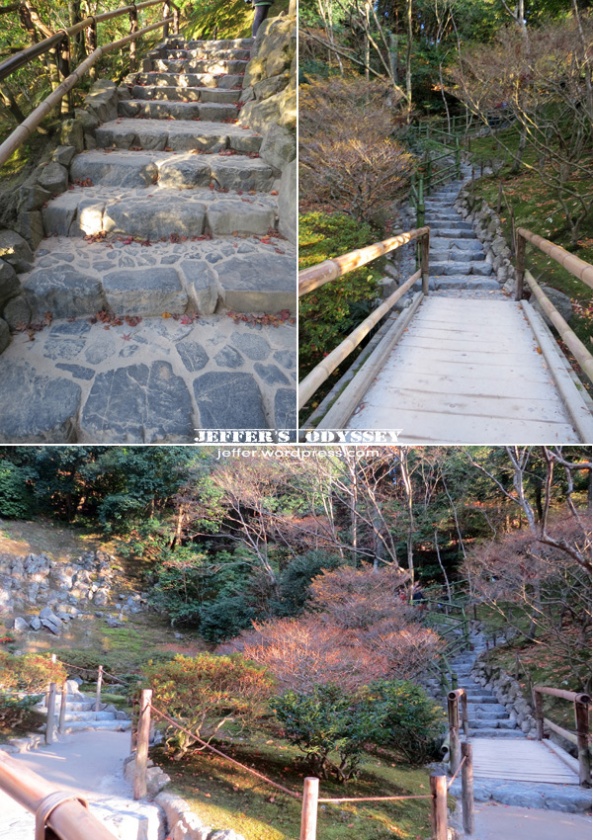 It felt great to just stand there, look down, and check out the view. Oh, and with parts of Kyoto beyond the temple grounds.
It felt great to just stand there, look down, and check out the view. Oh, and with parts of Kyoto beyond the temple grounds.

 Going down took us past another pathway which, interestingly enough, was lined with woven bamboo walls. Interspersed with fall colors, of course. And a constant glimpse of Ginkaku-ji itself.
Going down took us past another pathway which, interestingly enough, was lined with woven bamboo walls. Interspersed with fall colors, of course. And a constant glimpse of Ginkaku-ji itself.

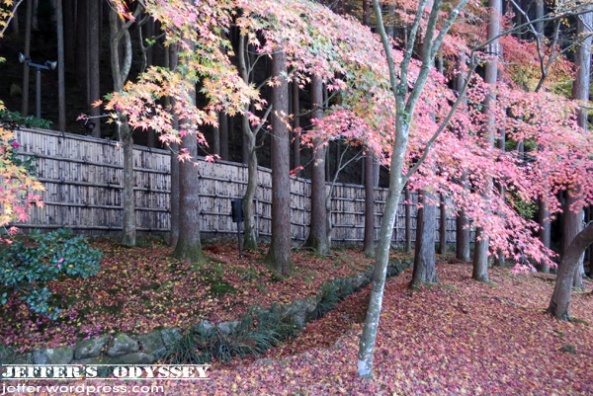
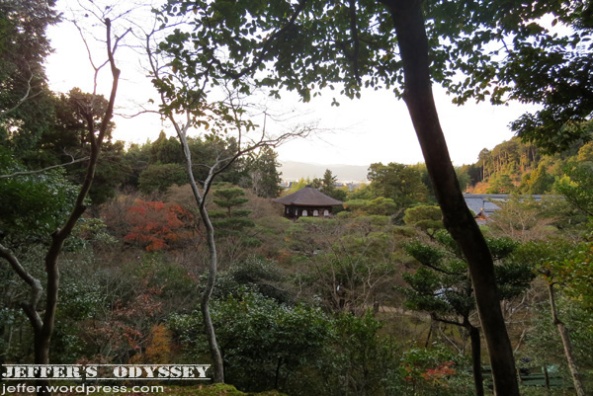
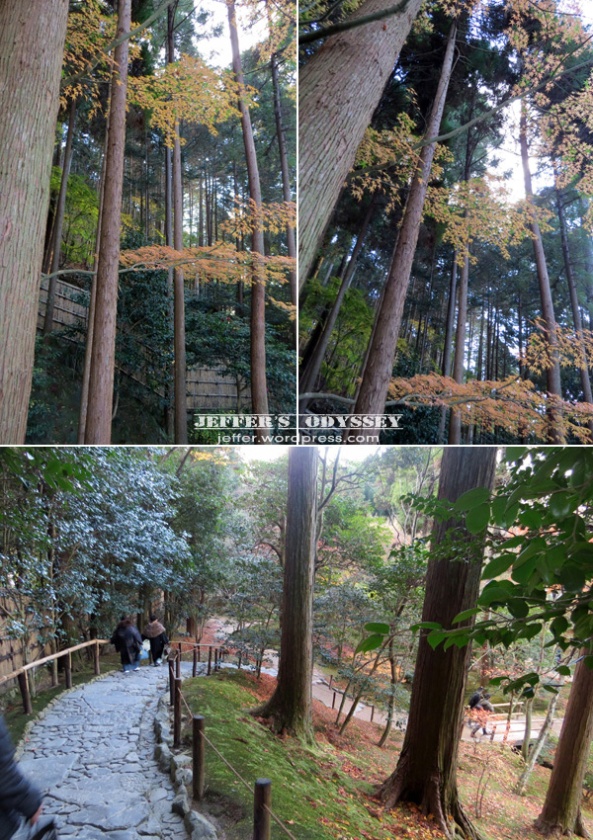 Finally we arrived and got to see Ginkaku up close.
Finally we arrived and got to see Ginkaku up close.
Going in, I was expecting something silvery. After all, Kinkaku-ji was all golden, even the bird perched atop the roof. This one, despite the name, did not have a silvery sheen to it. According to some of my readings, Yoshimasa planned for it to have a silver effect; after all, he modeled it after Kinkaku-ji. For some reason, the plan didn’t go through.
Silver or not, though, it was still quite something to behold.

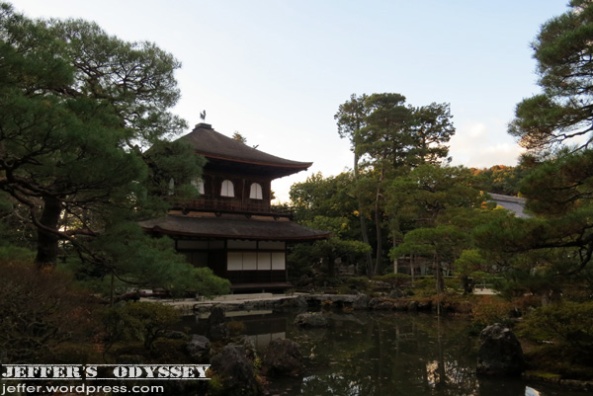 The original name of this central structure of this place is Kannon-den. It has two levels, with the two boasting different architectural types.
The original name of this central structure of this place is Kannon-den. It has two levels, with the two boasting different architectural types.
The first level features traditional Japanese residential architectural style (called Shoin style), while the second level was built in the Chinese architectural style.
This, too, was not open to the public.

 See that bird on top of the Ginkaku? It is a bronze phoenix, and it was made to face the east. This phoenix is said to be guarding Ginkaku-ji, and is dedicated to the Goddess of Mercy, Kannonbosatsu.
See that bird on top of the Ginkaku? It is a bronze phoenix, and it was made to face the east. This phoenix is said to be guarding Ginkaku-ji, and is dedicated to the Goddess of Mercy, Kannonbosatsu.
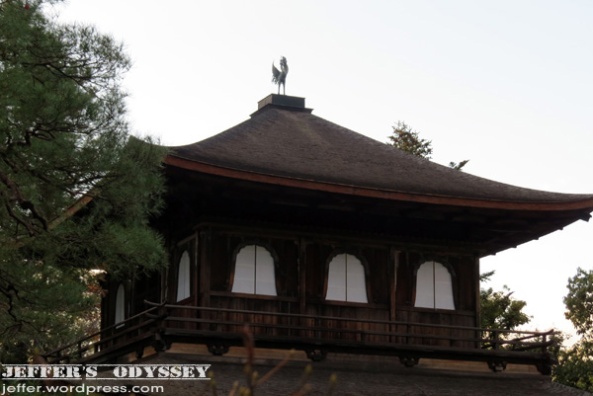
 Here, we see another proof of how the Japanese put a high value on Japanese cypress, using it for their thatched roofs and shingles. Check out the sample, and the roof of the Ginkaku itself.
Here, we see another proof of how the Japanese put a high value on Japanese cypress, using it for their thatched roofs and shingles. Check out the sample, and the roof of the Ginkaku itself.
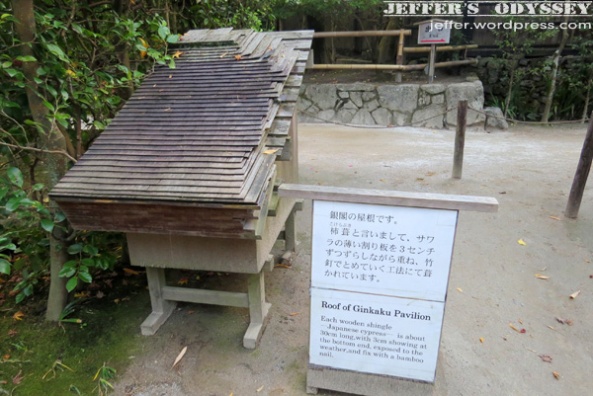
 Going back out, we once again passed through the hedge. And made many attempts to take photos. 🙂
Going back out, we once again passed through the hedge. And made many attempts to take photos. 🙂
 I have to say that the Japanese sand gardens here are my favorites so far, from what I’ve seen. The others looked good, but the Ginshadan and the Kogetsudai won it for me.
I have to say that the Japanese sand gardens here are my favorites so far, from what I’ve seen. The others looked good, but the Ginshadan and the Kogetsudai won it for me.
On the way back to the bus stop, we gave in and tried some of the cream puffs being sold at one of the stores (with free barley tea, mind you). Custard, this time, because I didn’t want to get tired of matcha. This one was yummy, but oooohsorich, I had to get seconds on the tea.
 I would like to thank Peach for this photo, haha! I love it. 🙂
I would like to thank Peach for this photo, haha! I love it. 🙂
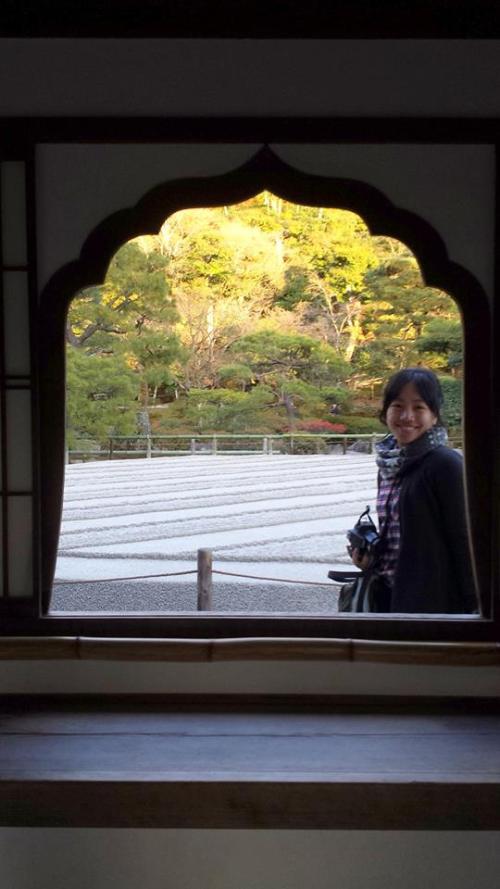 How to get there: Take the bus. Either Bus No. 5, 7, or 100. They start from Kyoto Station, by the way. Fare is 230 JPY.
How to get there: Take the bus. Either Bus No. 5, 7, or 100. They start from Kyoto Station, by the way. Fare is 230 JPY.
